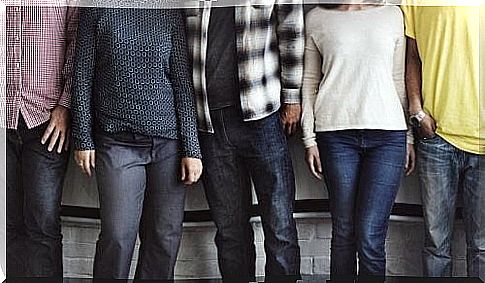Role Theory: What Is Our Social Role In Society?

Our social role represents what activities or behaviors people expect from us in a given social environment. Who are the ones who define what actions we should take? Has anyone already given us that role, or are we making it ourselves? We answer these questions in this article.
We play a role within all groups. We can easily see it in a team. For example, the defender or attacker, the captain or the goalkeeper. There are roles in families, such as mother, father or brother. They also exist at work: director, secretary, colleague or assistant. A person, depending on the context, can play several roles. They can be a work colleague, a son in a family or the juggler in a group of friends.
We can create our own social role or we can adapt to existing ones. Other team members can basically define what type of behavior they expect from you. These expectations are generalized and each person must ultimately accept your personal qualities.

Stressors related to our social role
Problems arising from our social role can come from various sources:
- Ambiguity. In this case, someone expects us to adapt to a role we do not understand. It is not clear, and we do not know what others want from us or how they want us to contribute to the group.
- Conflicting roles. In this section we talk about two ideas. The first is conflict within the same role. This happens when the role does not suit the person. Whatever the reason, we can not adapt to what people expect from us because their requests exceed our capabilities. Their requests may also contradict our values, which means that we do not feel comfortable complying with their wishes. The second type of problem is when two different roles conflict with each other. For example, I may have two different roles in a group, such as being a teacher and continuing my studies or being a parent with a job. This situation will cause stress because it will be very difficult to meet the expectations that both roles require.
- Assigned roles. These are problems that arise from having to adapt to a role that people have already defined for us. In these situations, there is little room to build and expand the role that makes it unique to us. A good example of this type of stress can be gender roles. If you are a woman, you may feel that you have to act in a certain way just because you are a woman, even if those actions are not true to who you are.
- Role overload of role. When people expect too much from us, we can be overwhelmed. The role can take too much energy, and this means that we exceed our ability to adapt. This in turn generates stress.
- Bad roles. This problem is the opposite of role overload. In contrast to overload is a bad role when we feel we can not give our maximum potential. We feel that we can give more of ourselves, but the role does not allow this to happen.

To build a role
Our social role in society or in a group is dynamic and constantly evolving. In many cases, during this transformation, we have the greatest responsibility for the way it changes. In this way, problems usually arise when we are lost and insecure about ourselves. This happens when we try to take on a role that goes beyond our boundaries, or when we present ourselves too much too quickly. Body and mind have difficulty responding to radical changes.
Our social role should be unique and not transferable. There may be things we need to adapt to when we join a new group. These roles are likely to come with a set of general guidelines and actions, but they should accommodate us and not the other way around.
Building your role requires time and intelligence. After all, your role is an opportunity to show the world what you are capable of.









